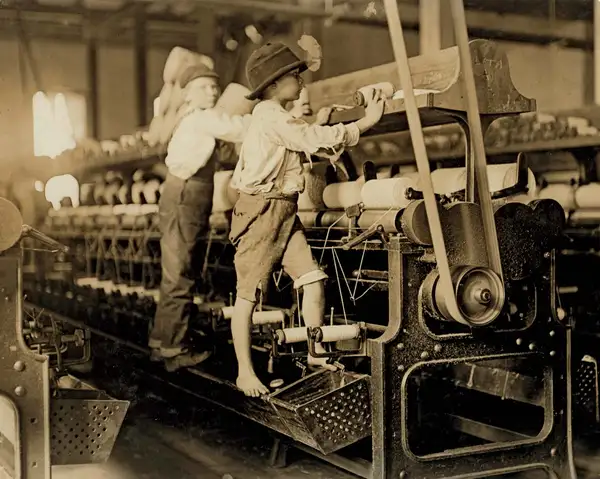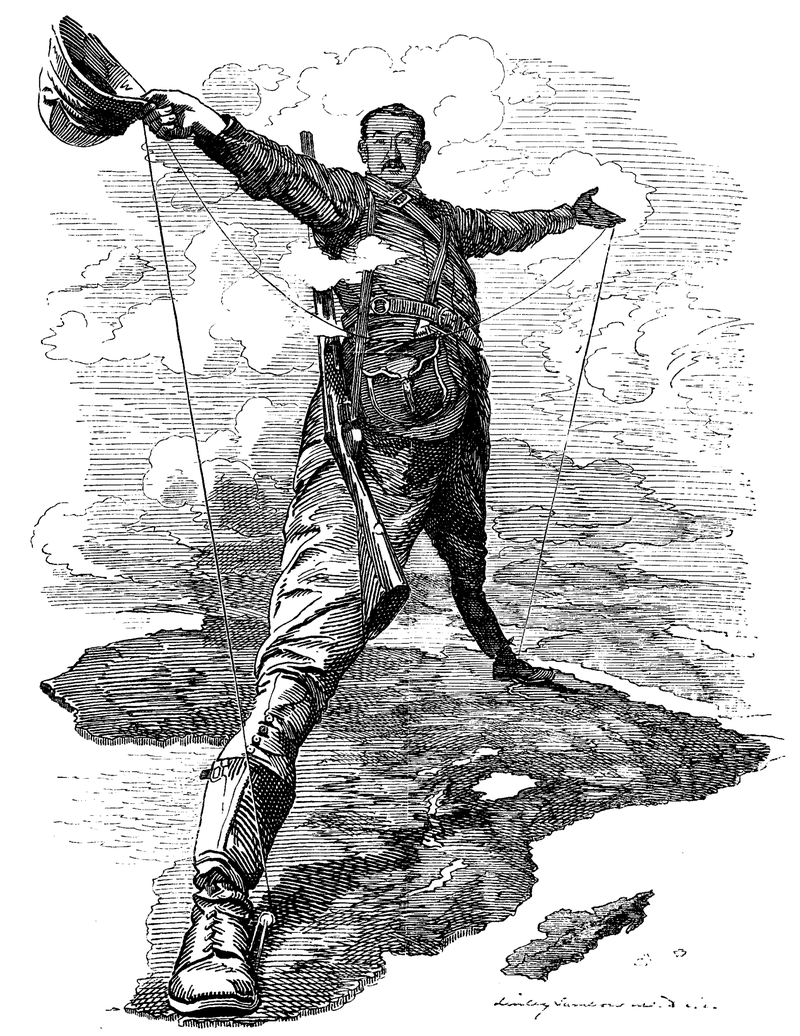Features of a Great Power
- Land, military power and industrial power.
- Land was important as it yielded resources such as farms and mines.
- Wealth, such as abundant resources, lots of food and a powerful military were also important for sustaining a country's army in possible conflicts.
- Transportation was important for carrying around military and resources, as well as for messages.
- International relations were necessary for trade and forming alliances.
- Colonies were a positive addition as they provided rare or valuable resources for usually cheap prices (although it cost a lot to set up a colony so their value is debatable).
- Colonies became more important after the industrial revolution as factories made exotic resources such as rubber more valuable and transport and travel became cheaper.
The Needs of a Great Power
Military
- Military prowess, such as a large navy and infantry.
- A powerful industry to supply a war effort.
- A large workforce.
Industrialization
- Industrialization in the 18th and 19th century led to rapid development in means of production and technology.
- This meant that countries could expand far quicker and conflicts would be far more devastating.
- It led to improvements in education and living standards for the working class (although it took some time to develop fairer working conditions).
- Many people moved from the countryside to large cities.
- There was a large need for fuel for production, mainly coal and oil.
- Steel manufacturing became commonplace and demand for steel increased.

- Two boys working on a factory mill. At the start of the industrial revolution, child labor, harsh working conditions, poor health conditions, strict punishments and grueling 12-hour working days were the norm.
National Unity
- States without national unity would often have many internal disagreements and problems.
- Resources would be wasted sorting out riots and protests such as troops, armaments and time.
- With national unity, more money could be spent combatting opposing forces instead of on domestic affairs.
- National unity can be achieved via education, which was often used as a tool due to being able to teach people to follow certain ideologies and beliefs.
- Control over media was also used to maintain national unity, such as propaganda and changing or hiding unwanted reports or news stories.
- Control over media was applied to different extents depending on the country.
Colonies
- Colonies could provide raw materials necessary for production such as rubber and cotton.
- Additional territory to show off an empire's power.
- Colonies allowed for the opening of trade markets with other empires, trading for valuable resources.
- Military and commercial bases were established in colonies.
- Often cheap work due to slave labor.
- More job opportunities would be opened in colonies for people in the mainland.
The Great Powers of Europe
- At the time the most powerful countries in Europe were Great Britain, Germany, France, Russia, Austria-Hungary and Italy.
- These countries had large armies, means of production and influence over neighboring countries and other great powers.
Life in Industrialized Europe
Medicine
- The industrial revolution led to many new technologies and improvements to life.
- Hygiene improvements and new medicine prevented intoxication and disease.
- The invention of new treatments such as antibiotics.
- The first vaccinations became more common.
- Improvements in healthcare led to an increased average lifespan.
Population
- A lot of the population moved from farms on the countryside to big cities to work in factories.
- This was due to a rise in new job opportunities.
- However soon cities became very crowded.
- Colonies opened more job opportunities abroad for people living in crowded cities.
- Otherwise people could go on strikes or revolutions if finding jobs became difficult, which governments wanted to avoid.
- The increase in work improved the power and economy of industrialized nations.
The Age of Imperialism
Imperialism
- Imperialism was a foreign policy that was followed by most great powers throughout the early 19th century.
- The policy aims to expand a nations territory and power by conquering usually overseas areas.
- Establishing colonies and building an empire.
- Imperialism closely coincides with colonialism which is the practice (or policy) of conquering other countries exploiting it economically and occupying it with settlers (forming colonies).
- Although colonialism and imperialism are very similar they aren't synonyms as imperialism is the policy of extending a nation's power and influence through colonization, use of military forces or through other methods.
- Colonialism was before the 19th century and focused more on colonies whereas Imperialism, which was after the 19th century focused more on tying colonies to empires and obtaining power.
The Age of Imperialism
- The Age of Imperialism was from 1870 to 1914.
- Great Powers, most notably Great Britain and France had been conquering colonies since the 16th century.
- Some other notable nations such as the Netherlands, although Great Britain was on top by a large margin.
- Countries that started colonizing later on were Germany and Italy.
- New technology in the 19th century, such as telegram lines made ruling over territories more organized and easier.
- Before a message from England to the Indian colony would have taken weeks to deliver, but with telegrams it could be reduced down to days.
- Improvements in transport allowed for efficient shipping of resources and materials overseas.
- Empires wanted colonies to seem powerful and be on-par with other empires.
- Germany also wanted colonies, as chancellor Otto von Bismarck wanted colonies around the 1880s to reflect their economic might.
- Germany started to build a large navy which began to worry Great Britain and France.
- Great Britain began expanding its navy to stay ahead of Germany as Great Britain heavily focused on naval might.
- Otto von Bismarck later realized that colonies would only profit resources and some taxes which couldn't outweigh the requirement of military and infrastructure to keep the colony under control.
- However Kaisers Wilhelm I and Wilhelm II both wanted colonies to show off German might, so they would go against this idea later on.
The View of European Citizens
- Despite the many violations of human rights and general mistreatment that occurred in colonies (although an extreme example, in King Leopold II's colony of the Congo led to the deaths of an estimated 5 to 10 million people) many people weren't against them.
- This was because most Europeans viewed the natives living in colonized countries as wild savages.
- Many people thought that they were helping, and even had a duty to do so by "civilizing" the natives.
- This meant pushing their own culture and ideologies onto the natives and sometimes less oppressive things such as building infrastructure like schools and hospitals.
- Most services were poorly managed however, as people working in colonies did it for profit instead of out of passion.
- The term of the "White Man's Burden" was coined.
- Stating that it was the so called duty of people from more industrially developed countries to "civilize" the "savage and primitive" natives in colonies.
- However this was only an excuse to justify exploitation and harassment, and in the modern day most colonized countries are far worse off than they would have been otherwise.
- Most people in the mainland weren't aware of the extent that colonies were exploited or just weren't bothered by it.
- For example Rudyard Kipling who wrote the poem "The White Man's Burden" even states in the poem that Great Britain was sending off its best people to work in scummy colonies.
- However most people working in colonies were those who couldn't find work elsewhere. Far from the "best people".
Economy
- Colonies were beneficial to industrialization.
- Raw resources such as rubber and cotton for cheap prices and increased trade.

- Above is a cartoon depicting Cecil Rhodes, a British mining magnate and politician.
- He had found great success in Africa, becoming very rich by exploiting the country.
- Because of his power and riches in Africa he wanted to build a telegram line from one end to the other, which the cartoon depicts as he stretches from one end to the other.
- The cartoon is meant to be a satire of Cecil Rhode's monopolistic exploitation of Africa rather than being meant to honor him.
- Cecil Rhodes even managed to name a country, Rhodesia, after himself. It would have now been located in the territory of Zimbabwe.
Ideology
- Charles Darwin's theory of evolution had begun to gain traction and popularity, however this led to misinterpretations and twisting of the theory in the favor of politics.
- The idea of cultural survival of the fittest was common.
- It was believed that if cultures (referring to countries) had to beat out other cultures to avoid being wiped out.
- This was heavily influenced by Nationalism which further led people to view their own cultures as superior.
- This caused people to have a negative view to mostly non-European nations (other than the United States, which was mostly populated by European settlers).
- This belief was also similar to eugenics which would become more widespread later on.
- Eugenics was the belief that some cultures and groups were genetically "superior".
Technology
- New technology had made colonies more viable to have, as previously they would have been a drain of resources and money as they had to be kept under control.
- Steam ships and railroads allowed for quick transport of materials.
- Telegraph lines made communication and management far easier.
- Medicine was an important development as previously colonies would have been very dangerous for Europeans as they hadn't yet developed immunity to the diseases there, causing them to be far more deadly.
- The British discovered that the chemical quinine provided protection against malaria. When it was added to tonic water the taste was so bad that they added ginger, leading to the tonic ginger we know today.
- Countries could give a company the rights to rule over a colony.
- The company would given free rule over a certain territory and had to pay fees and taxes in exchange.
- Companies in charge of colonies were very profitable, as they completely ignored human rights and fair treatment, exploiting workers to very extreme extents.
- The Sepoy Mutiny, or the First War of Independence in India caused the dissolution of the East India Company and the rule over the area was replaced by the more responsible British Government.
- An ever growing rivalry between European states led to the expansion of and increase in colonies.
Definitions
Image Sources
https://www.britannica.com/story/the-rise-of-the-machines-pros-and-cons-of-the-industrial-revolution